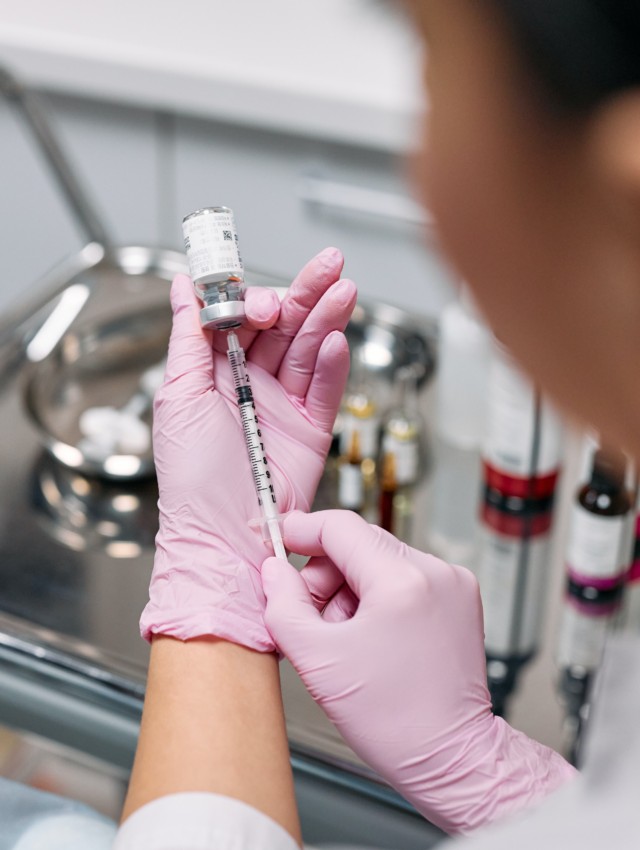The field of fertility treatment is a very unique one in which it’s not taught in most nursing school curriculums.
It’s a niche specialty, so I’m sure you have a ton of questions about what being an IVF nurse is like!
I have been an IVF nurse since 2021. I have worked as a labor and delivery nurse before, so I am familiar with women’s health.
However, infertility is a specific field in which I did not know many terms and pathophysiology when I first started.
The role of an IVF nurse is an extremely valuable one in that they coordinate a patient’s entire treatment course and serve as their main support throughout their journies.
An infertility journey can be anywhere from 2 months to multiple years.
The emotional reward an IVF nurse gets when she tells her patient she’s pregnant is beyond fulfilling. On the other side of the coin, many patients, unfortunately, don’t get pregnant.
When your patient has a bad outcome after you’ve invested your heart in her care, it can feel like losing a part of yourself.
While there are challenges in being an IVF nurse, there are many more rewards, and it’s a beautiful specialty to work in.
I. Becoming an IVF Nurse
The road to becoming an IVF nurse consists of some planning and honestly…some luck. Having a women’s health background to work as an IVF nurse is not required, but it will surely increase your chances!
The beauty of being a nurse is that you can work in any specialty without extra schooling. It’s all about the roads you take, the people you know, and your interview skills.
It is common for many IVF nurses to have been former labor and delivery nurses. It’s the standard trajectory when wanting to leave bedside care but stay within women’s health or reproductive health.
There are no extra certifications or courses required to become an IVF nurse.

II. The IVF Nurse’s Role and Responsibilities
While the main role of an IVF nurse is to coordinate a patient’s treatment plan alongside the doctor’s orders, she is also responsible for consistent education and follow-up.
Coordinating a patient’s “cycle plan” starts with informing the patient about all requirements that need to be met in order to begin treatment.
These requirements consist of general labwork, signed consents, and specific testing for that patient to ensure an optimal treatment cycle can be done.
Every month is not exactly the same in a woman’s menstrual cycle regarding the number of eggs or uterine lining thickness.
Patients are frequently monitored while they are in treatment, so the IVF nurse is responsible to communicate plan updates and next steps after each visit.
Here is a basic list of all tasks an IVF nurse may be responsible for:
- Assisting with scans
- Performing patient assessments
- Educating patients on a treatment plan
- Educating patients on medication administration
- Assisting with embryo transfers
- Assisting with ultrasounds
- Teaching menopausal women about symptoms and treatment options
- Contacting patients to inform them of test results
And of course, a considerable part of IVF treatment is the injections. Patients are expected to administer the injections themselves at home, so the IVF nurse provides thorough and clear education to ensure the patient feels confident and comfortable.
The IVF nurse is also in close collaboration and frequent communication with the provider.
It is across the board for nurses to have strong communication skills to ensure orders are being followed correctly and there is a low chance of medical errors.
IVF Nurse Salary
The salary for an IVF nurse is usually a little less than a hospital salary, but many places offer quite a similar amount. Each state is so different in how much they pay, so the range really goes from $60k-$110k.
If you are more experienced or in a senior/leadership role, it’ll be higher.
III. A Day in the Life
A typical morning for an IVF nurse is to start by checking voicemails and emails she may have received after hours.
Time management and organization are two skills that are absolute musts for an IVF nurse.
Understanding what is a priority while making sure non-urgent matters are not missed is a daily requirement.
Patients also tend to come in during the morning hours for monitoring, which is when the provider will perform an ultrasound to assess the ovaries and uterus, as well as get bloodwork done to monitor their hormone levels.
These two pieces tell the provider the current status of a patient’s ovarian reserve, or in simpler terms, the number of eggs she has at that moment.

Medications and Egg Retrieval
As mentioned earlier, the IVF nurse is the main instructor of medications.
Almost every patient has never even held a syringe, so you can imagine how frightened and anxious they are to inject a needle in themselves!
Their number one question is “Does IVF hurt?”
Patients have to inject themselves for 9-12 days in a row. Yikes.
Of course, no injection feels good, so it is definitely not a painless journey. However, it’s quick, the needles are relatively small, and it’s 2-3 a day, all at the same time.
I’m a nurse- but just imagining being in their shoes gives me the tingles. It can really be so scary.
This is why it’s so essential for the IVF nurse to be a strong educator.
Aside from teaching patients how to inject themselves, the nurse is also teaching them about common concerns, side effects, and emotional management.
The grand finale is the egg retrieval, where the provider retrieves all of the eggs the patient grew during her treatment cycle. This is an OR procedure under deep sedation.
Depending on the clinic and company, the IVF nurse may also be the OR/PACU nurse. It all depends on the size and patient volume of the particular clinic.
V. Fertilization and Embryo Transfer: Emotional Moments

After egg retrieval is done, the eggs are fertilized to become embryos.
Not all make it, so the nurse may also be updating the patient on the eggs’/embryos’ progress.
These conversations can be quite emotional if they had bad outcomes.
Once a patient has a healthy embryo and prepares for an embryo transfer (which the IVF nurse also coordinates), the embryo transfer will occur.
The IVF nurse assists the provider during this simple (yet monumental) procedure.
In my clinic, the IVF nurse assists by guiding the abdominal ultrasound during the embryo transfer.
Celebrating Victories

Honestly, being an IVF nurse can be a lot of fun if you decide to be your complete self!
You have a lot of opportunities to express your personality and style of nursing as an IVF nurse.
You have frequent conversations with your patients, from phone calls to emails to in-person. You can form really good relationships with your patients.
It’s always fun celebrating victories with them. I myself have said “Woohoo” and “Yaaay!” on the phone to my patients, as well as choked up while they took a moment to cry tears of happiness.
I always go back to thinking…an IVF nurse’s 1-minute phone call during her normal work day could be 1 minute that completely changes the patient’s life.
That is so powerful.
Pursuing a Career as an IVF Nurse: Practical Tips
If you’re looking to pursue a career as an IVF nurse, I have a few tips that will really help you land the role.
- Leverage your women’s health experience, if applicable, during your job applications and interviews. IVF nurse managers (like myself!) know there isn’t really any other field that ties as closely to reproductive medicine as labor and delivery or gynecology.
- Highlight your skills in time management and organization. Remember when I said these are critical in an IVF nurse’s role?
- Emphasize that you are a good listener and that empathy is a natural gift. Many nurses lack proper empathy skills and how to communicate them, so make sure you clarify that you’re not like that!
- Seek guidance from mentors! Whether that’s your colleague, a friend who went through IVF, or handy online resources.
- E-mail IVF clinics even if you don’t see a job posting. You never know if the right eyes will see it at the right time, and spark an interest in getting to know you.
- Network on LinkedIn. Search nearby IVF clinics, connect with the recruiting manager or nurse manager, and send over a captivating message! You can search for IVF Nurse or IVF Nurse Manager under the “My Network” category and narrow it down to your location to find employees who work in nearby IVF clinics!
Conclusion
I hope this post shines a light on what it’s like to be an IVF nurse, as well as how to become one yourself.
One of the avenues to being a healthier, happier nurse is finding the right career for you.
If IVF nursing was ever an interest of yours, you now have the proper knowledge and insight to help you make a decision!
As an IVF nurse, you have the opportunity to make a significant impact in the lives of hopeful parents, bringing joy and fulfillment to families seeking the miracle of parenthood.




Leave a Reply